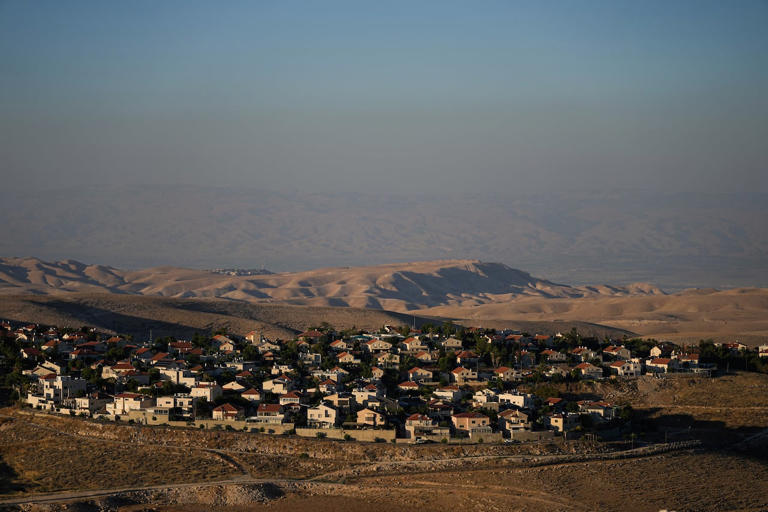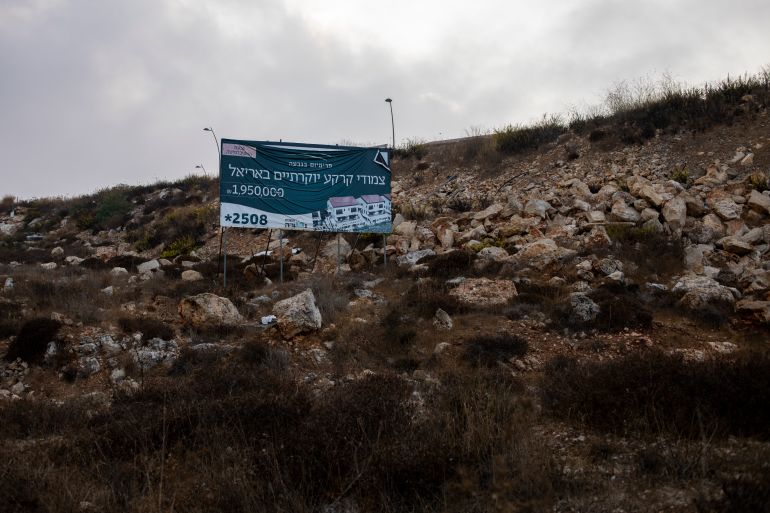Story by CBC/Radio-Canada • Yesterday

A view of the Israeli settlement of Kedar, in the West Bank, on Monday. Israel's far-right government on Monday approved plans to build thousands of new homes in the occupied West Bank, a move that threatened to worsen increasingly strained relations with the United States.
© Ohad Zwigenberg/The Associated Press
The Canadian government has joined a chorus of allies condemning Israel's approval of more than 5,700 settlement units in the occupied West Bank, a move that comes amid surging violence in the region.
In a joint statement with her Australian and U.K. counterparts Friday, Foreign Affairs Minister Mélanie Joly says she is gravely concerned by the move.
"The continued expansion of settlements is an obstacle to peace and negatively impacts efforts to achieve a negotiated two-state solution," says the statement.
"We call on the government of Israel to reverse these decisions."
On Monday, Prime Minister Benjamin Netanyahu's far-right coalition government approved more than 5,700 new settlement units in the West Bank.
Much of the international community sees the settlements, built on land captured by Israel in the 1967 Middle East war, as illegal and inflammatory.
Their presence is one of the fundamental issues in the ongoing Israeli-Palestinian conflict. The temperature has been on the rise over the past 15 months amid Palestinian street attacks and Israeli settler aggression.
"The cycle of violence in Israel and the West Bank must be broken," said Friday's joint statement.
"We are also deeply troubled by the continued violence and loss of life in Israel and in the West Bank."
The statement says the three countries "unequivocally condemn" the terrorist attack on June 20 in Eli targeting Israeli civilians and the "reprehensible and ongoing settler violence targeting Palestinians."
Earlier this week the U.S. also condemned the new settlements.
Peace talks aimed at establishing a Palestinian state in the West Bank, East Jerusalem and Gaza collapsed in 2014.
The Canadian government has joined a chorus of allies condemning Israel's approval of more than 5,700 settlement units in the occupied West Bank, a move that comes amid surging violence in the region.
In a joint statement with her Australian and U.K. counterparts Friday, Foreign Affairs Minister Mélanie Joly says she is gravely concerned by the move.
"The continued expansion of settlements is an obstacle to peace and negatively impacts efforts to achieve a negotiated two-state solution," says the statement.
"We call on the government of Israel to reverse these decisions."
On Monday, Prime Minister Benjamin Netanyahu's far-right coalition government approved more than 5,700 new settlement units in the West Bank.
Much of the international community sees the settlements, built on land captured by Israel in the 1967 Middle East war, as illegal and inflammatory.
Their presence is one of the fundamental issues in the ongoing Israeli-Palestinian conflict. The temperature has been on the rise over the past 15 months amid Palestinian street attacks and Israeli settler aggression.
"The cycle of violence in Israel and the West Bank must be broken," said Friday's joint statement.
"We are also deeply troubled by the continued violence and loss of life in Israel and in the West Bank."
The statement says the three countries "unequivocally condemn" the terrorist attack on June 20 in Eli targeting Israeli civilians and the "reprehensible and ongoing settler violence targeting Palestinians."
Earlier this week the U.S. also condemned the new settlements.
Peace talks aimed at establishing a Palestinian state in the West Bank, East Jerusalem and Gaza collapsed in 2014.
Australia, Canada, UK ‘deeply concerned’ over Israeli settlements
The continued expansion of settlements is an obstacle to peace, the three countries said in a joint statement.

Published On 1 Jul 2023
The governments of Australia, Canada and the United Kingdom have said they are “deeply concerned” about recent events in the occupied West Bank, including Israel’s decision to expand its illegal settlements there amid rising violence, saying they “further reduce the prospects for peace”.
“The continued expansion of settlements is an obstacle to peace and negatively impacts efforts to achieve a negotiated two-state solution. We call on the Government of Israel to reverse these decisions,” the foreign ministers of the three countries said in a joint statement released on Saturday.
Israel’s defence ministry planning committee that oversees settlement construction approved more than 5,000 new settlement homes on June 26. Settlements are considered illegal under international law.
US ‘deeply troubled’ by major settlement expansion in Israel
The foreign ministers’ statement also expressed concern about the changes to the settlement approval process approved on June 18, in which far-right Finance Minister Bezalel Smotrich was given sweeping powers to expedite their construction, bypassing measures that have been in place for 27 years.
The settlement expansion plans have occurred as violence in the region has intensified in recent weeks.
On June 19, Israeli forces stormed the Jenin refugee camp, deploying the use of helicopter gunships in the occupied West Bank for the first time in 20 years. That raid killed seven Palestinians and injured 91 others.
Palestinian gunmen then targeted Israelis, while Israeli settlers carried out a string of attacks on Palestinian villages.
The Australian, Canadian and British governments condemned violence targeting both Israelis and Palestinians.
They also welcomed the joint statement by Israeli security chiefs equating the Israeli settler attacks to “nationalist terrorism”.
Nearly 750,000 Israelis live in 250 illegal settlements in the occupied West Bank, built on land captured by Israel in the 1967 Six-Day War.
SOURCE: AL JAZEERA AND NEWS AGENCIES
The continued expansion of settlements is an obstacle to peace, the three countries said in a joint statement.

A billboard advertising housing projects hangs on a hill in the West Bank Jewish settlement of Ariel near the Palestinian town of Nablus
[File: Ariel Schalit/AP Photo]
Published On 1 Jul 2023
The governments of Australia, Canada and the United Kingdom have said they are “deeply concerned” about recent events in the occupied West Bank, including Israel’s decision to expand its illegal settlements there amid rising violence, saying they “further reduce the prospects for peace”.
“The continued expansion of settlements is an obstacle to peace and negatively impacts efforts to achieve a negotiated two-state solution. We call on the Government of Israel to reverse these decisions,” the foreign ministers of the three countries said in a joint statement released on Saturday.
Israel’s defence ministry planning committee that oversees settlement construction approved more than 5,000 new settlement homes on June 26. Settlements are considered illegal under international law.
US ‘deeply troubled’ by major settlement expansion in Israel
The foreign ministers’ statement also expressed concern about the changes to the settlement approval process approved on June 18, in which far-right Finance Minister Bezalel Smotrich was given sweeping powers to expedite their construction, bypassing measures that have been in place for 27 years.
The settlement expansion plans have occurred as violence in the region has intensified in recent weeks.
On June 19, Israeli forces stormed the Jenin refugee camp, deploying the use of helicopter gunships in the occupied West Bank for the first time in 20 years. That raid killed seven Palestinians and injured 91 others.
Palestinian gunmen then targeted Israelis, while Israeli settlers carried out a string of attacks on Palestinian villages.
The Australian, Canadian and British governments condemned violence targeting both Israelis and Palestinians.
They also welcomed the joint statement by Israeli security chiefs equating the Israeli settler attacks to “nationalist terrorism”.
Nearly 750,000 Israelis live in 250 illegal settlements in the occupied West Bank, built on land captured by Israel in the 1967 Six-Day War.
SOURCE: AL JAZEERA AND NEWS AGENCIES
No comments:
Post a Comment